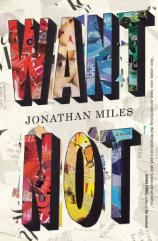Want Not
Review
Want Not
Jonathan Miles pulls out all the stops for an amazing read: humor so dark you’re shuddering and laughing at the same time, a cast of characters drawn with Dickens’s own pen, and head-on collisions with questions that matter and answers that come in fierce but roundabout ways. What do civilizations leave behind for future generations? Is it art, or language, or underground storage for 800,000 steel drums of radioactive waste in Carlsbad, New Mexico?
Could memory be a choice? An old man who asks over and over for his dead wife’s phone number somehow perfectly recites Ozymandias; Shelley’s sonnet is embedded in his memory. Alzheimer’s has not claimed those 14 lines. Could recollections be like works of art? Magnificent ones hung “beneath metal halide lighting on stark museum walls, for daily straightening and dusting, while the shoddy ones were abandoned to attics, yard sales, to that unheeded space above the headboards in off-ramp motel rooms?” May we decide what we remember and what we don’t?
The central idea in WANT NOT, however, is the ridiculous nature of America and Americans as we produce, finagle for, discard, and constantly rummage and want for more. There are three separate story lines that begin on Thanksgiving 2008.
"Jonathan Miles pulls out all the stops for an amazing read: humor so dark you’re shuddering and laughing at the same time, a cast of characters drawn with Dickens’s own pen, and head-on collisions with questions that matter and answers that come in fierce but roundabout ways."
On East 4th Street in New York City, Talmadge, a canner and dumpster diver, is sifting through “the effluvia of the Key Food bakery department,” choosing Portuguese rolls and muffins for dinner. He takes the food to Micah, his lover and companion, a woman “like the cakey, crumbly, worm-turned soil that farmers scooped and lifted to their noses in the early spring,” an earth mother. They are squatters in an abandoned third-floor apartment dominated by Maybelle, a painting of a roly-poly nude lounging on her side, surrounded by fruits and vegetables. The rooms in which Micah and Talmadge are living, in deepest gaudy Manhattan, have no electricity.
Before Micah was born, her father witnessed a horrific car accident, and as a sort of absolution of faith, he believed he saw God in a landscape in Tennessee, 77 acres with not much access. The three lived in complete isolation for 10 years until the state government took her away for immunizations and education, and put her in a foster family (who were totally hung up on Hamburger Helper and could not understand her reluctance to eat it). She is forced to attend school where she is mortified, humiliated and taunted by the “locals.” Her mother disappears while her father is intent on repossessing his daughter; she is never seen again. Micah’s life has always been on the edge of living close to the bone, close to the land.
Meanwhile, on this same Thanksgiving in 2008, Elwin Cross, Jr., a prominent professor of linguistics at Marasmus State College, has hit a deer on Route 202, and were it not for the “two bottles of midrange Douro red” he drank with a friend whose despair surpassed his own, he would have left the animal alone. But he stuffs the dead deer into the back of his Jeep and takes it to his now-empty home (his wife Maury recently left him for a chef) where he hoists it on a fire escape rail to dress it. His neighbor’s son, a 22-year-old with zombie eyes who is also exceedingly drunk, joins him, in awe of Doc and his illegal activities. The two finish butchering the doe, and Elwin goes to bed watching the uninvited sunlight mark the walls of his bedroom.
And another meanwhile introduces Sara, who has gone to a storage facility in upstate New York to find a roasting pan. Her first husband, Brian, died in the 9/11 attack, and as she sorts through boxes and boxes of her former life, she remembers the infidelity that she discovered through pages of emails to his mistress. She was destroyed. Again. However, her second husband, Dave, is fabulously wealthy and has paid for breast augmentation and an exceedingly rich life for her and her daughter, Alexis. She leaves the storage unit and goes to Williams-Sonoma to buy the same All-Clad roaster she had packed away. Her life with Dave will never be her life with Brian, and for that, today, she is grateful.
Very much like pieces of steel being drawn slowly and inexorably toward a magnet, these three narratives move toward one another. And they meet. Don’t expect a Love Always wrap-up, but there will be recognition that even in the midst of glut and waste and abundance, the human spirit prevails.
Reviewed by Jane Krebs on December 20, 2013





